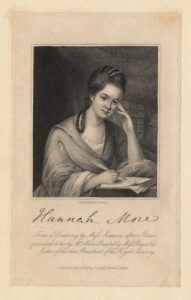
Hannah Moore
*Hannah More was born on this date in 1745. She was a white-English poet and abolitionist.
From Stapleton, Gloucestershire, England, Moore was the most influential female member of the Society for Effecting the Abolition of the African Slave Trade. She was educated at Bristol, an important slave-trading town, and began to publish her writing in the 1760s while she was still a teenager. Her first play, The Inflexible Captive, was staged at Bath in 1775. Later in the 1770s, and for much of the 1780s, she spent time in London. She made the acquaintance of many political and societal figures, including Samuel Johnson, Edmund Burke, and Elizabeth Montagu.
Her play Percy was produced by David Garrick in 1777, and Fatal Falsehood was staged in 1779, but she came to regard the theatre as morally wrong, especially after the death of her mentor, Garrick and Johnson. She turned to religious writing, beginning with her Sacred Dramas in 1782. In 1784-5, she 'discovered' Ann Yearsley, the so-called 'poetical milkmaid of Bristol', whose poems More helped to publish, although the two later fell out.
In the 1780s, she widened her circle to include religious and philanthropic figures, including John Newton, Beilby Porteus, and William Wilberforce. In the summer of 1786, she spent time with Sir Charles and Lady Margaret Middleton at their home in Teston in Kent. The local vicar James Ramsay and a young Thomas Clarkson were among their guests, central to the early abolition campaign. More and Clarkson met again in Bristol in 1787; however, in the same year, More met Wilberforce, and their friendship was to become deep and lasting.
More contributed much to the running of the newly founded Abolition Society, including, in February 1788, her publication of Slavery, a Poem, an important slavery poem of the abolition period. Her relationship with members of society, especially Wilberforce, was close. By the mid-1790s, she had become closely involved with the 'Clapham Sect' of evangelical Christians, many of whom were involved in the abolition campaign. Throughout the 1790s, she wrote several religious tracts, known as the Cheap Repository Tracts, that eventually led to the formation of the Religious Tracts Society.
Several of the Tracts oppose slavery and the slave trade, in particular, her poem The Sorrows of Yamba, or, The Negro Woman's Lamentation, which appeared in November 1795. However, the tracts have also been noted for encouraging social quietism in an age of revolution. She continued to oppose slavery throughout her life, but at the time of the Abolition Bill of 1807, her health did not permit her to take as active a role in the movement as before.
Later in life, she dedicated a lot of time to religious writing. Nevertheless, her most popular work was a novel, Coelebs in Search of a Wife, which appeared in two volumes in 1809 (and ran to nine editions in 1809 alone). In the 1820s, she grew gradually less well but continued to write. On her death on Sept. 7, 1833, she left more than £30,000 to charities and religious societies (equivalent to about £2,000,000 or $3,000,000 in 2004).